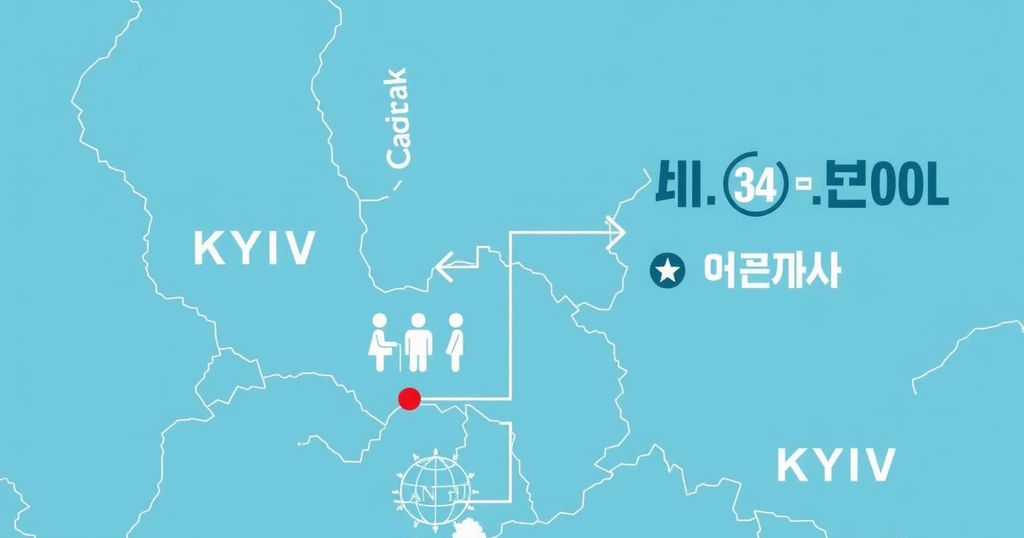World news
AND, ANDRII SYBIHA, ASIA, BIDEN ADMINISTRATION, CHO, CHO TAE - YUL, ENERGY INFRASTRUCTURE, EUROPE, EUROPE/ASIA, JOINT CHIEFS OF STAFF, KOREA, SOUTH, KYIV, MARK RUTTE, MILITARY, MINISTRY OF FOREIGN AFFAIRS OF, NEWSWEEK, REFUGEES, RUSSIA, SBU, SEOUL, U. K, UKRAINE, WAR, YONHAP NEWS AGENCY
Oliver Grayson
0 Comments
Kyiv and Seoul Engage in Talks Over North Korean POWs
Ukrainian and South Korean diplomats discussed the repatriation of North Korean prisoners of war captured during the conflict in Ukraine. South Korea’s Foreign Minister stated a willingness to accept these soldiers as citizens, raising concerns regarding international law and potential diplomatic repercussions. The involvement of North Korean soldiers in the war alongside Russian forces has intensified discussions about humanitarian aid and the consequences of their repatriation.
Ukrainian and South Korean officials conducted a telephone discussion concerning the prospects of North Korean prisoners of war captured in Ukraine. This dialogue underscores the significant humanitarian and diplomatic implications surrounding the treatment of these individuals, particularly as the conflict evolves due to escalating pressures from Russia on manpower. South Korea’s history of humanitarian aid to Ukraine further complicates its potential involvement with captured North Koreans.
South Korea’s Foreign Minister Cho Tae-yul conversed with his counterpart, Andrii Sybiha, affirming that South Korea is prepared to accept North Korean soldiers, as they are recognized as citizens under the South Korean constitution. Furthermore, Cho declared that Seoul would support any defection requests from the captured soldiers, reflecting the country’s willingness to provide a refuge for them.
The capture of North Korean soldiers has become a strategic concern; Ukraine apprehended its first two live North Korean soldiers in January and has been providing them with necessary medical aid. However, prior intelligence noted that the captured soldiers did not express intent to defect to South Korea, highlighting the complexities of their situation.
The involvement of North Korean troops in the conflict has gained international attention, with estimates indicating approximately 12,000 soldiers were deployed by Pyongyang to support Russian forces. Reports suggest substantial casualties among these troops, posing further concerns regarding their operational roles in the ongoing war.
Amidst the discussions, Andriy Kovalenko from Ukraine’s National Security Council indicated that North Korean soldiers are increasingly engaged in combat operations, intensifying the conflict dynamics. Additionally, the Joint Chiefs of Staff in South Korea warned of North Korea’s likely intentions to dispatch more personnel and resources to assist Russia.
Diplomatic channels remain active, as expressed by Minister Sybiha’s post on social media, where he conveyed gratitude for South Korea’s solidarity with Ukraine and highlighted the dangers stemming from the growing Russia-North Korea cooperation.
Reactions to these developments include concerns over potential violations of international law regarding the repatriation of North Korean soldiers. Notable voices have criticized any attempts to link their repatriation with armament negotiations, arguing that such actions contravene humanitarian principles defined by the Geneva Conventions.
Both Ukrainian President Volodymyr Zelensky and other officials have emphasized their commitment to transparency in handling the POW situation by ensuring that captured North Koreans receive appropriate care. While North Korea has yet to formally respond to South Korea’s overtures concerning the POWs, the global community closely monitors these evolving diplomatic discussions.
In conclusion, the ongoing dialogue between Ukraine and South Korea regarding North Korean prisoners of war highlights complex humanitarian and geopolitical challenges stemming from the conflict. As both nations navigate the intricacies of repatriation and defection processes, the implications for international law and diplomatic relations remain significant, warranting continued observation and engagement from the global community.
Original Source: www.newsweek.com




Post Comment